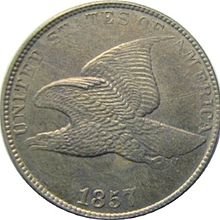Coinage Act of 1857
| United States | |
| Value | 1 cent (.01 U.S. dollars) |
|---|---|
| Mass | 4.67 g |
| Diameter | 19 mm |
| Edge | Plain |
| Composition |
|
| Years of minting | 1856–1858 |
| Obverse | |
 |
|
| Design | Eagle in flight |
| Designer | James B. Longacre |
| Design date | 1856 |
| Reverse | |
 |
|
| Design | Denomination enclosed by wreath |
| Designer | James B. Longacre |
| Design date | 1856 |
The Coinage Act of 1857 (Act of Feb. 21, 1857, Chap. 56, 34th Cong., Sess. III, 11 Stat. 163) was an act of the United States Congress which ended the status of foreign coins as legal tender, repealing all acts "authorizing the currency of foreign gold or silver coins". Specific coins would be exchanged at the Treasury and re-coined. The act is divided into seven sections.
Before the Act, foreign coins, such as the Spanish dollar, were widely used and allowed as legal tender by the Act of April 10, 1806. The Coinage Act of 1857 also discontinued the half cent. Furthermore, the penny was reduced in size. The large cent was discontinued and regular coinage of the Flying Eagle cent began.
In the newly created union after the Revolutionary War and up until 1792 and the establishment of the US mint, the sole medium of exchange in terms of specie was foreign coin. Alexander Hamilton had proposed that foreign coin (of which he specially based the dollar) circulate freely for a period of three years until the new mint in Philadelphia was running at full capacity in order to have a smooth transition. This clause was renewed several times after being first specifically spelled out on April 10, 1806. By 1830, about 25% of all circulating coins were milled of Spanish origin.President Andrew Jackson supported foreign coin as legal tender in his famous war with the Bank of the US in the Gold Bill. This new development ended up making it difficult for the US to retain its overvalued worn Spanish silver in the 1840s. By the late 1840s and early 1850s, the US mint had finally been able to match demand for foreign coin.
...
Wikipedia
